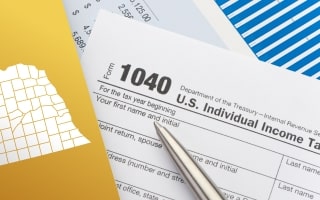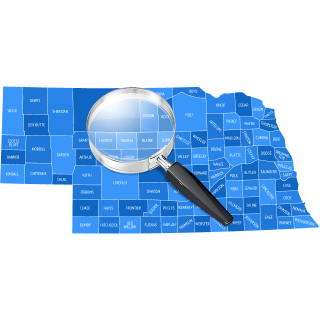Property Tax Records in Nebraska

Purchasing real estate in Nebraska comes with high property taxes. The average property tax rate in the country is around 0.99%. In comparison, the average rate in Nebraska is 1.61, which means that property owners pay some of the highest taxes in the country. Some counties have tax rates that exceed 2%.
While most homeowners choose to pay their taxes with their mortgage payments, you can also do so in two installments. Most counties require first-half payments by May 1 and second-half payments by September 1. However, Lancaster, Douglas, and Sarpy counties collect these taxes on April 1 and August 1.
Your property taxes are based on what your home is valued at. Every property has a market value and an assessed value, the latter of which is most important to county assessors. Once the county identifies the value of your home, they can charge taxes.
Property taxes were established by the Nebraska Territorial Legislature in 1857, which was a decade before Nebraska became a state. The Nebraska Homestead Exemption Act was eventually passed in 1969. At that point, the exemption covered $800 of any homes with assessed values above $4,000.
Property Tax Assessment in Nebraska

When you purchase a home in Nebraska, the property taxes you end up paying will be determined based on the market value and the local tax rate. The tax rate will be applied to your home's assessed value. Property tax assessment in Nebraska is a straightforward and quick process, so there's no need to worry.
In Nebraska, most real property is assessed at 100% of the actual market value. If your home has a market value of $350,000, the assessed value will be the same. Keep in mind that horticultural and agricultural land is assessed at 75% of the market value.
All homes in Nebraska are evaluated by county assessors. This process is completed well before June 1. The state is restricted from levying property taxes, which means that they are collected by counties. The various tax districts that require funding include city governments and school districts.
When calculating your annual property taxes, you'll discover that tax rates are displayed as a small percentage of $100 in taxable value. You must multiply the taxable value by the effective tax rate in your county. If the effective tax rate is 2% in your county, your annual taxes will amount to $7,000 on a $350,000 home. You may be able to reduce your taxes with the Nebraska homestead exemption. The average tax rates in the most populous Nebraska counties are:
- Douglas County: 2.16%
- Lancaster County: 1.99%
- Sarpy County: 2.18%
- Hall County: 1.63%
- Buffalo County: 1.53%
Douglas County property taxes are much higher than the state average, but as you can see, Sarp County taxes are also on the higher end. Even places like Buffalo and Hall County have higher than average taxes when compared to the national average.
Calculate Nebraska Taxes
It is wise to use a Nebraska property tax calculator to gain a clearer understanding of how property taxes are calculated in the state. This tool simplifies the process for both homeowners and real estate investors by allowing users to input key property details, such as location, assessed value, and property classification, to estimate their tax assessment and annual liability based on local levy rates, which vary by county, school district, and other taxing authorities.
A Nebraska property tax calculator can also help identify eligibility for exemptions and tax relief programs. Nebraska offers several property tax relief options, including the Homestead Exemption Program for seniors, disabled individuals, and veterans, which can significantly reduce or eliminate property taxes based on income and home value. The Property Tax Credit Program also provides a statewide tax credit funded by the state to help reduce local tax burdens. Using the calculator helps estimate these benefits and plan more effectively for your tax obligations.
using our property tax calculator.
Nebraska Property Tax Records: What Are They?

When property owners pay their taxes, the money is collected by the county government in which they reside. In Nebraska, these revenues often pay for public services like infrastructure, public schools, county governments, police departments, and fire departments.
When you're thinking of buying a home in Nebraska, you can learn about the property and its taxes by researching the public records available to you. Property tax records are made available by each county in Nebraska.
For example, let's say you live in Omaha, which is part of Douglas County, which is the most populated county in Nebraska. They offer a valuation lookup tool that allows the public to find Nebraska property tax records if they know the owner's name, location address, parcel number, or subdivision. Once you submit this info, you'll receive the homeowners records and also, informations like:
-
Parcel number
-
Key number
-
Property address
-
Tax description
-
Subdivision
-
Tax district
-
Acres
-
Assessed valuation
-
Recent sales
-
Treasurer's tax report
-
Maps
-
Images
Property Tax Exemptions and Deductions in Nebraska

While most homeowners in Nebraska pay high property taxes, Nebraska offers a homestead exemption to qualifying owners. The purpose of an exemption is to help you reduce your annual property taxes. If you qualify, it's highly recommended that you apply for the Nebraska Homestead Exemption. Here's everything you need to know about the program.
Nebraska Homestead Exemption: While most states provide numerous exemptions and deductions that homeowners can take advantage of, the sole tax break that homeowners have access to in Nebraska is the Homestead Exemption. This program can reduce some or all of your Nebraska property taxes if you qualify. However, you must own and live in the home to benefit from this exemption. The categories of people who qualify for this exemption include the following:
- Homeowners who are at least 65 years old
- Qualified disabled individuals
- Totally permanent disabled veterans
- Individuals with a developmental disability
- Totally temporary disabled veterans
- Surviving spouses of disabled veterans
Keep in mind that there are some basic income limits and home value requirements that you'll need to adhere to if you wish to qualify. However, some categories don't need to meet these requirements. For example, the income limits and value guidelines don't apply to totally permanent disabled veterans and veterans with a total temporary disability. Keep in mind that these guidelines can change every year.
If you're a married individual who's over the age of 65, the percentage of tax relief that you qualify for depends on your current income level. For example, if the annual income in your household ranges from $52,000-$54,200, you'll be able to claim a 40% reduction in your property taxes. If you make less than $41,000, you don't need to pay property taxes for the year. For some disabled veterans and individuals, the income limit increases by around $5,000 with each bracket.
How To Search Property Tax Records in Nebraska

When you want to find property records in Nebraska, you have a couple of options to choose from. The assessor in each county provides public tax records through an online database. If you know which county the property is located in, you should be able to find the database without running into obstacles.
The Nebraska Department of Revenue provides a helpful page that lists each county and its parcel search database. Use this page to find the county assessor's website.
You can also access these records with a third-party tool, such as PropertyChecker. They offer deed and property tax records for every state, including Nebraska. You can search by the owner's name, parcel ID, property address, owner's phone number, or owner's email. Once you enter this info, it may be a minute or two before the reports are collated. The reports you receive will contain such details as:
-
Tax records
-
Owner's name and mailing address
-
Loan records
-
Deeds
-
Purchase history, including sale prices and sale dates
-
Extensive neighborhood info
-
Current and past property values
-
Relevant property details, including everything from lot size to bedroom count
-
Lien records
-
Building permits
-
Foreclosures
How To Appeal Property Taxes in Nebraska

Every year, you'll receive a Notice of Assessment from the county assessor that tells you what your home's current value is. You should receive this letter by June 1. Keep in mind, however, that this notification is only mailed out when the property's assessed value has changed. If your home's value is the same as it was last year, you may be able to estimate your annual Nebraska property taxes before you receive your bill.
If your Notice of Assessment indicates that your home's value has increased significantly over the past year, the assessor may have made an error. They might believe that you renovated your home. There's also a chance that they simply made a mistake and included the wrong information, which might be why your home's assessed value is higher than it should be. In this situation, you can appeal. Here's what this process entails.
Step 1: You should receive your assessment notice by June 1. If you live in a county with a population of less than 150,000, you might receive a preliminary valuation notice by January 15.
This notice will include the current and previous valuations. If you believe that the amount is inaccurate, you can request an informal review with your county assessor. If you've gathered any evidence that proves your claim, report it during this review.
Step 2: When an informal review isn't successful, homeowners have the opportunity to appeal to the county Board of Equalization. Make sure you submit this appeal between June 1 and June 30. Include any information that shows the property has not been accurately assessed.
Each county can have a slightly different appeals process. However, the Board of Equalization must decide by August 2.
Step 3: If you're still not satisfied, you can file another appeal with the Tax Equalization and Review Commission by August 24. This is an informal review that's held by the state. Your filing fee depends on the value of your home. For example, if your home's assessed value is lower than $250,000, your filing fee will be $40. The filing fee can be as high as $85 for valuation appeals.
Step 4: To appeal to the state commission, you must file the "Appeal to the Nebraska Tax Equalization and Review Commission" form. Keep in mind that they don't have an electronic filing system, which means that you'll need to send it by mail. While these hearings are often informal, you can request a formal one.
Step 5: The decision by the Nebraska Tax Equalization and Review Commission is considered final. However, you can still appeal it with the Nebraska Court of Appeals. They'll look at your evidence and determine if your home's assessed value should be reduced.
How Property Tax Records Impact Real Estate Transactions in Nebraska

No matter which county you live in, you'll be tasked with paying high property taxes. The only county with a tax rate below 1% is Wheeler, which has a current rate of 0.87%. The average property tax bill in Nebraska is just over $3,000. If you divide that into 12 installments, you'll need to pay another $250 as part of your monthly mortgage payments. Property tax records have a major impact on most real estate transactions throughout Nebraska.
When a potential buyer is searching for the right home, they need to consider how much property taxes will add to their mortgage payments when estimating what they can afford. Some buyers in Nebraska may avoid making offers on homes in counties with high tax rates. Homeowners in these counties might need to offer concessions to ensure these transactions are completed without delay.
High property taxes are also relevant to real estate investors. Most investors buy real estate to earn more than they spend on repairs and loan payments. If an investor can earn profits of $250 per month from 10 properties, they'll collect $2,500 in monthly income from their investment portfolio. However, property taxes can change the equation. High taxes make it more challenging to earn positive cash flow.
Investors in Nebraska can also acquire real estate via property tax sales. When homeowners don't pay their taxes by the due date, they become delinquent, at which point the county treasurer may choose to sell the property. The purpose of this sale is to ensure that the overdue taxes are recovered.
After a property is sold in a public auction, the investor will receive a "Certificate of Purchase". The current owner will then have three years to repay their taxes, which is referred to as a "redemption" period. If the owner pays off their debt and the interest that accrues, the investor will no longer have a claim to the property. To redeem a property after the three years, the investor will be tasked with paying all the owed taxes.
Free Nebraska Property Tax Lookup
Tax Records Please wait...
Property Tax Guide
- Property Tax Records in Nebraska
- Property Tax Assessment in Nebraska
- Nebraska Property Tax Records: What Are They?
- Property Tax Exemptions and Deductions in Nebraska
- How To Search Property Tax Records in Nebraska
- How To Appeal Property Taxes in Nebraska
- How Property Tax Records Impact Real Estate Transactions in Nebraska
Instant Access to Nebraska Property Records
- Owner(s)
- Deed Records
- Loans & Liens
- Values
- Taxes
- Building Permits
- Purchase History
- Property Details
- And More!
Free Nebraska Property Tax Lookup
Tax Records Please wait...
Property Tax Guide
- Property Tax Records in Nebraska
- Property Tax Assessment in Nebraska
- Nebraska Property Tax Records: What Are They?
- Property Tax Exemptions and Deductions in Nebraska
- How To Search Property Tax Records in Nebraska
- How To Appeal Property Taxes in Nebraska
- How Property Tax Records Impact Real Estate Transactions in Nebraska